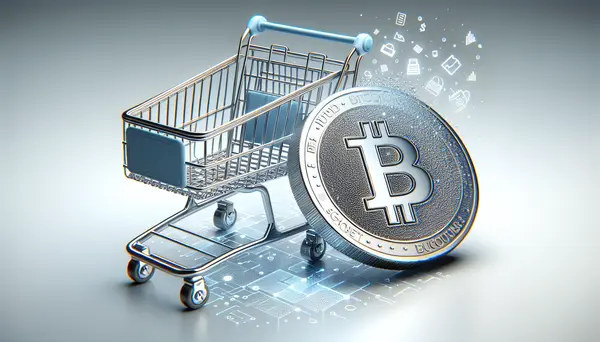Table of Contents:
In today's digital world, the rapid evolution and adoption of cryptocurrencies, particularly Bitcoin, is reshaping traditional financial systems. Our journey into understanding the amalgamation of Bitcoin and E-commerce begins with a primer on these two key concepts.
Introduction to Bitcoin and E-commerce
Bitcoin is the first-of-its-kind digital currency, also referred to as a cryptocurrency. It operates on the decentralized and innovative technology domain known as blockchain. Besides its trademark attribute of decentralization, Bitcoin provides a more secure platform for financial transactions, free from governmental intervention and currency manipulation.
The Best Mining Providers at a Glance
» Infinity HashFrom our perspective, currently the best mining provider on the market. With the community concept, you participate in a mining pool completely managed by professionals. A portion of the earnings are used for expansion and maintenance. We've never seen this solved as cleanly anywhere else.
» Hashing24A well-known and established cloud hosting company. With a good entry point and in a good market phase, a good ROI can also be generated with some patience. Unfortunately, we see the durations as a major drawback.
Moving onto E-commerce, aka Electronic Commerce, it defines the modern-day commercial transactions conducted over the internet. The industry has seen exponential growth over the past decade and continues to revolutionize the manner in which businesses operate, reaching customers far beyond geographical boundaries.
The union of Bitcoin and E-commerce seems almost inevitable in this tech-savvy world. The anticipated amalgamation could very well lead to improved transaction efficiency, enhanced security and privacy, and potentially reshape the global E-commerce landscape.
The Intersection of Bitcoin and E-commerce
Increasingly, the intersection of Bitcoin and E-commerce has been shaping the global marketplace. More and more businesses are beginning to embrace Bitcoin as an alternative form of payment, drawn to its potential perks such as low transaction fees, fast settlement times, and access to a broader, global consumer base.
Bitcoin transactions essentially eliminate the reliance on traditional banking structures by taking a peer-to-peer approach, thereby eradicating typical banking fees and charges. Furthermore, the nature of blockchain technology, the backbone of Bitcoin, brings a significant uplift in transaction security and privacy as compared to typical credit card processes.
An increasing number of E-commerce giants have begun to see the potential of Bitcoin and are integrating it into their payment systems. This trend indicates a promising future for this harmonic alliance of innovative financial technology and the sprawling world of E-commerce.
Pros and Cons of Bitcoin in E-commerce
| Pros | Cons |
|---|---|
| Low Transaction Fees | Price Volatility |
| No Chargebacks | Regulatory Uncertainty |
| International Transactions made easy | Limited Acceptance |
| Fraud Protection | Technical Barriers and Complexity |
Bitcoin's Role in Streamlining E-commerce

The breakthrough of Bitcoin comes in, injecting a newfound sense of ease and standardization to E-commerce transactions. The integration of Bitcoin in E-commerce eliminates the need for currency conversions, vital in geographically diverse markets, allowing seamless and smooth transactions regardless of national borders.
Moreover, Bitcoin transactions provide nearly instantaneous confirmations, eliminating the long processing time associated with traditional banking methods. This expedites the entire buying process, providing customers with a transformed and improved online shopping experience.
Another alluring aspect is the heightened security that Bitcoin provides. Due to its innate blockchain technology, every transaction undertaken is immutable and transparent, significantly reducing the chances of fraudulent activity.
Last but not least, Bitcoin, by virtue of its decentralized nature, allows for global inclusivity in the E-commerce sphere. This opens up E-commerce markets to unbanked and underbanked populations around the globe, leading to an expanded consumer base.
In essence, the amalgam of Bitcoin and E-commerce paves the way for an elevated and more efficient online shopping experience, promising an exciting era in the digital commerce domain.
Benefits of Embracing Bitcoin in E-commerce
Adopting Bitcoin as a payment method in E-commerce presents many exciting advantages for both businesses and consumers. Let’s delve into some key benefits:
Attracting a New Breed of Consumers: As cryptocurrencies gain popularity among millennials and tech-savvy users, accepting Bitcoin can help businesses draw this audience. These consumers value the innovation, independence, and privacy control inherent to cryptocurrencies like Bitcoin.
Lower Risk of Chargebacks: Unlike traditional credit transactions that can be disputed and reversed, Bitcoin transactions are irreversible. This reduces business exposure to fraudulent chargebacks. Consumers also enjoy peace of mind with this certainty.
Market Differentiation: With Bitcoin still being a fairly new concept in E-commerce, businesses accepting this cryptocurrency could benefit from a unique selling proposition (USP) standpoint. They can capture market share by promoting their forward-thinking approach and willingness to embrace modern digital solutions.
Zero Inflation Impact: As Bitcoin is not tied to any country, it is immune to inflation. This safeguards businesses from losing value on their sales due to domestic currency devaluation.
These benefits provide businesses with a strong incentive to integrate Bitcoin into their E-commerce strategy, positioning them to reap the full rewards of this evolving digital landscape.
Challenges of Using Bitcoin in E-commerce

While the benefits of using Bitcoin in E-commerce are evident, it's crucial to recognize that there are also challenges to be addressed.
Price Volatility: Bitcoin's value can be highly volatile, with significant swings happening on a daily basis. This renders it risky for businesses as they may lose quite a bit if Bitcoin's value drops dramatically between the time of a transaction and when they exchange it for traditional currency.
Regulatory Environment: Governments and regulatory bodies across the globe are still figuring out how to manage and regulate cryptocurrencies. The lack of a well-defined regulatory framework brings an element of uncertainty for businesses considering the adoption of Bitcoin.
Security Concerns: Although Bitcoin offers significant security advantages, as mentioned earlier, it's not completely immune to risks. Cyber attacks and hacks with the aim of stealing Bitcoins are not uncommon. Therefore, businesses need to invest significantly in security measures, which might deter some, especially smaller retailers.
Adoption Rates: Most consumers are still unfamiliar with Bitcoin and other cryptocurrencies. Despite the growing interest, adoption rates are still relatively low, and not everyone is ready or willing to shop using Bitcoin.
These challenges pose serious considerations for businesses contemplating integrating Bitcoin into their E-commerce platforms. It's vital for both consumers and businesses to understand the potential risk-reward balance and make well-informed decisions.
Conclusion and Final Thoughts
In the dynamic world of E-commerce, the adoption of innovative technologies like Bitcoin is no longer merely an option, but increasingly a necessity for businesses to stay competitive. Bitcoin's unique attributes provide answers to some of the challenges E-commerce has faced, such as transaction speed, security, and global inclusivity.
While the relationship between Bitcoin and E-commerce is still in its infancy, early adopters are already paving their pathways to success with this novel digital currency. As technology continues to progress and cryptocurrencies like Bitcoin become more mainstream, we can only expect its influence in the E-commerce realm to grow. The potential for a harmonious relationship between Bitcoin and E-commerce is undeniably evident, making it a match worthy of further exploration and attention.
As we navigate through this era of digitalization, we carry with us the anticipation of what benefits Bitcoin can bring to the dynamic and versatile stage of E-commerce. The future of E-commerce could very well be intertwined with the evolution of Bitcoin, and that is a future to look forward to.
Understanding Bitcoin's Role in E-Commerce

What is the relationship between Bitcoin and E-commerce?
Bitcoin is a digital currency that can be used as a method of payment in e-commerce. It offers advantages such as low transaction fees and the ability to make payments globally, which can be beneficial for e-commerce businesses.
What are the advantages of using Bitcoin in E-commerce?
Bitcoin transactions are usually faster and cheaper than traditional payment methods. Bitcoin also provides a degree of privacy as transactions don't need to go through a bank. This can also widen the customer base to include those without access to traditional banking systems.
Are there risks to using Bitcoin in E-commerce?
Yes, there are risks. Bitcoin’s value is extremely volatile which can complicate pricing products within a business. Also, while transactions are secure, bitcoins stored in a digital wallet are susceptible to theft if not properly secured. Bitcoin transactions are also irreversible, meaning if a mistake is made it cannot be undone.
How can E-commerce businesses accept Bitcoin?
E-commerce business can use a payment processing company like BitPay or CoinGate to handle Bitcoin payment transactions. These services convert Bitcoin into the merchant's local currency and usually provide features such as shopping cart plugins or dedicated APIs.
Is Bitcoin the future of E-commerce?
While Bitcoin certainly has potential in the e-commerce industry, its future dominance is not guaranteed. Its volatile nature and regulatory uncertainties pose challenges. However, as technology evolves and the digital currency becomes more universally accepted, it could become an integral part of e-commerce in the future.










